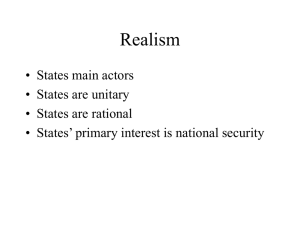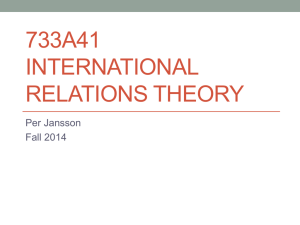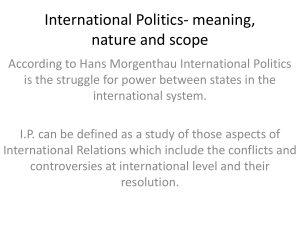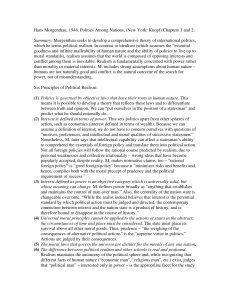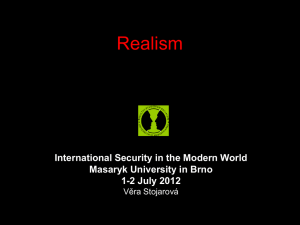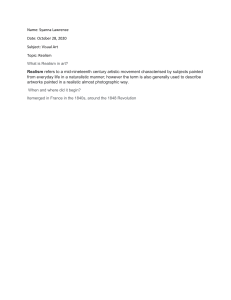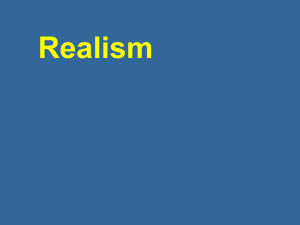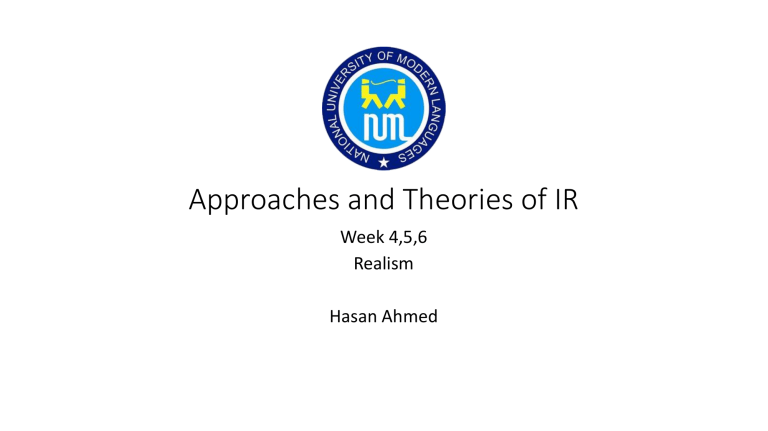
Approaches and Theories of IR Week 4,5,6 Realism Hasan Ahmed Introduction: Elements of Realism • Basic realist ideas and assumptions are: 1. a pessimistic view of human nature; 2. a conviction that international relations are necessarily conflictual and that international conflicts are ultimately resolved by war; 3. a high regard for the values of national security and state survival; 4. a basic skepticism that there can be progress in international politics which is comparable to that in domestic political life Classical Realism • What is classical realism? • Who are the leading classical realists? • What are their key ideas and arguments? (1) the ancient Greek historian Thucydides; (2) the Renaissance Italian political theorist Niccolò Machiavelli; (3) the seventeenth-century English political and legal philosopher Thomas Hobbes (4) twentieth-century German–American IR theorist, Hans J. Morgenthau. Thucydides • IR for Thucydides → inevitable competition & conflict between ancient Greek city-states (Hellas) + Hellas & other empires (Macedonia & Persia). • Hellas or non-Greek neighbors → not equal • Few ‘great powers’→ as Athens, Sparta, Persian Empire, • Many smaller & lesser powers → such as the tiny island statelets of the Aegean Sea. Thucydides (471-400 BC) • This inequality = inevitable and natural distinctive feature of Thucydides’ realism → naturalist character. • Aristotle → ‘man is a political animal’. • Thucydides → political animals are highly unequal in their powers and capabilities to dominate others and to defend themselves. • All states, large and small, must adapt to that given reality of unequal power and conduct themselves accordingly. • If states do that, they will survive and perhaps even prosper. • If states fail to do that, they will place themselves in jeopardy and may even be destroyed. Thucydides • Limited choices available in conduct of foreign policy • Decisions have consequences → must be well thought (pros & cons) • Ethics & morality → take a backseat in an inequal world • Restricted FP choices, ever-present dangers & opportunities • Political ethics of classical realism → Foresight, prudence, caution, and judgement vs private morality and the principle of justice. • If a country and its government wish to survive and prosper, they better pay attention to these fundamental political maxims of IR. Thucydides • Thucydides’ realist philosophy → Peloponnesian War (431– 404 BCE). • The Melian Dialogue → account of the confrontation between the people of Melos, a colony of Sparta, and the Athenians in 416-415 B.C • Athens = great power vs Melos = minor power • Melians → appealed on the principle of justice → recognition as an independent state, honor & dignity should be respected • Thucydides’ IR → states = unequal = no equal treatment • IR is about → recognizing your relative strength or weakness, knowing your proper place, and adapting to the natural reality of unequal power. Probably the most famous example of the classical realist understanding of IR as basically an anarchy of separate states that have no real choice except to operate according to the principles and practices of power politics in which security and survival are the primary values and war is the final arbiter. Niccolò Machiavelli (1469-1527) • He wrote about power, balance of power, formation of alliances, causes of conflicts. • His primary focus was on national security. • Survival of the state is crucial. The main responsibility of the rulers is always to defend the interests of the state and ensure its survival. • Power (Lion)and deception(Fox) are two essential means for the conduct of foreign policy. If necessary, a ruler must be ruthless and deceptive while defending self-interest. • His famous work “The Prince” deals with how to gain, maintain and expand power. • Classical realist IR theory therefore is primarily a theory of survival. Suggestions of Machiavelli • World is a dangerous place, and also full of opportunities. One should take necessary measures against dangers. • If states want to enrich themselves, they should exploit opportunities. One should calculate rationally his interests and power against those of rival groups. • A responsible ruler should not follow Christian ethics such as be peaceful, avoid war, share your wealth, act in good faith... • Following such ethics = height of political irresponsibility • If states/rulers follow these values, they will disappear in the end. Suggestions of Machiavelli to the Rulers • Do not wait for things to happen. • Anticipate the motives and actions of others. • Do not wait for others to act. • Act before they do. • The prudent state leader acts to ward off any threat posed by his or her neighbors. • He or she should be prepared to engage in pre-emptive war and similar initiatives. • The realist state leader is alert to opportunities in any political situation, and is prepared and equipped to exploit them. Niccolo Machiavelli (1469-1527) • Political responsibility flows in a very different vein from ordinary, private morality. • The fundamental, overriding values are the security and the survival of the state; that is what must guide foreign policy. • Civic virtue aspect of Machiavellian realism → rulers have to be both lions and foxes people’s survival and prosperity. • People’s fate is entangled with the ruler’s fate. • That is the normative heart not only of Machiavellian realism but of classical realism generally Thomas Hobbes (1588-1679) • He had a pessimistic view of human nature. He emphasizes the necessity of having a powerful, centralized political authority. • State of nature → Human beings lived in a condition of war ‘every one against every one’. • He tried to show in order to escape from this situation, he suggested placing all power to a sovereign state or Leviathan (a state authority or supreme ruler) that would maintain order and end anarchy. Without order, no economic development, art, knowledge... Hobbes and Security Dilemma • Achievement of personal security and domestic security through the creation of a state leads to international insecurity that is rooted in the anarchy of the state system → security dilemma • No escape from the security dilemma as there is no possibility of forming a world government. • No higher authority over states to impose order. • international system → condition of anarchy. • States claim to be sovereign with a right to be independent and autonomous with respect to each other. social contract • Without a leviathan, distrust, conflict and war are inevitable → no permanent peace between states • Due to the survival concerns in anarchy, states are expected to act in balance of power logic. Hobbes and Morality • Due to the anarchy assumption, there is no fixed idea of good or bad. • Realism → might is right. • Law or morality does not apply beyond nation’s boundaries. • Hobbes asserts that without a superior authority to legislate codes of conduct, no morality or justice can exist. • ‘where there is no common power, no law; where no law, no justice. Classical realists: Commonalities • First, → the human condition is a condition of insecurity and conflict that must be addressed and dealt with. • Second → there is a body of political knowledge, or wisdom, to deal with the problem of security, and each of them tries to identify the keys to it. • Third → there is no final escape from this human condition, which is a permanent feature of human life. • There can be no enduring peace between states. • This pessimistic and unhopeful view is at the heart of the IR theory of the leading classical realist of the twentieth century, Hans J. Morgenthau. Hans Morgenthau • Hans Morgenthau → leading 20th-century figures in the study of international politics; considered one of the "founding fathers" of realist approach. • Human beings → evil by nature, born to pursue power and enjoy the benefits of power. • The final political space within which security is ensured is the independent state. • Beyond the state → security is impossible. • Lust for power → people into conflict with each other power politics • Organize in states to enjoy freedom & avoid foreign intervention → defend their interests → anarchy → international conflict → war • For Morgenthau, politics is a struggle for power. Hans Morgenthau • Struggle between states → use of force/ threats justified? • Morality for the private sphere vs. morality for the public sphere. • Political ethics allows some actions that would not be tolerated by private morality. • Critical of theorists/practitioners like Woodrow Wilson • who believed that it was necessary for political ethics to be brought into line with private ethics. • ‘the beginning of an age in which it will be insisted that the same standards of conduct and of responsibility for wrong shall be observed among nations and their governments that are observed among the individual citizens of civilized states’ (Wilson to the US Congress in 1917) Hans Morgenthau • Such a policy would be reckless in the extreme, ethical failure. • In crises/emergency situation states have to secure their people by using means considered immoral in private morality. • spying, lying, cheating, stealing, conspiring, and so on. • Sometimes it may be necessary to trample on human rights for the sake of the national interest: during war. • Sometimes, it may be necessary to sacrifice a lesser good for a greater good or to choose the lesser of two evils. • Plato →’noble lie’→ ‘Our rulers will probably have to make considerable use of lies and deceit for the good of their subjects.’ Morgenthau’s Principles of Realism • Politics is rooted in a permanent and unchanging human nature which is basically self-centered, self-regarding, and self-interested. • Politics is ‘an autonomous sphere of action’ and cannot therefore be reduced to morals (as Kantian or liberal theorists are prone to do). • Self-interest is a basic fact of the human condition. International politics is an arena of conflicting state interests. But interests are not fixed: the world is in flux and interests can change. Realism is a doctrine that responds to the fact of a changing political reality. Morgenthau’s Principles of Realism • The ethics of international relations is a political or situational ethics which is very different from private morality. • A political leader does not have the same freedom to do the right thing that a private citizen has. That is because a political leader has far heavier responsibilities than a private citizen. • The leader is responsible to the people (typically of his or her country) who depend on him or her; the leader is responsible for their security and welfare. • The responsible state leader should strive to do the best that circumstances permit on that particular day. • That circumscribed situation of political choice is the normative heart of classical realist ethics Morgenthau’s Principles of Realism • Realists are therefore opposed to the idea that particular nations can impose their ideologies on other nations and can employ their power in crusades to do that. Realists oppose that because they see it as a dangerous activity that threatens international peace and security. Ultimately, it could backfire and threaten the crusading country. • Statecraft is a sober and uninspiring activity that involves a profound awareness of human limitations and human imperfections. That pessimistic knowledge of human beings as they are and not as we might wish them to be is a difficult truth that lies at the heart of international politics. Kenneth Waltz & Neorealism • Waltz’s Theory of International Politics (1979) seeks to provide a scientific explanation of the international political system. • Takes some elements from classical realism → independent states existing and operating in system of international anarchy. • Doesn’t elaborate on → human nature; ethics of statecraft • Explanatory approach → heavily influenced by economic models • For Waltz → best IR theory is one that focuses centrally on the structure of the system, its interacting units, and on the continuities and changes of the system. • Classical realism → state leaders, international decisions and actions. Kenneth Waltz & Neorealism • Waltz’s Man, the State and War(1959) offered three ‘images’ of Realism • War caused by the nature of man (i.e. ‘bad people’); • War caused by the nature of states (i.e. ‘bad states’); • War arising from the anarchic structure of the international system (i.e. ‘there is nothing to stop bad people and states’). Kenneth Waltz & Neorealism • Waltz’s theory restricts the scope of theory to ‘international system’: • Impossible to understand the international system through unit-level theories: that would amount to reductionism • IR theory should be focus on the systemic level • In an anarchical system, units must be structurally similar (although their capabilities may vary) Kenneth Waltz & Neorealism • Waltz shares key assumptions with classical realism: sovereignty, statism and self-help. • Innovation: international politics works like the market. This means that ‘human nature’ based explanations should be dismissed. • Also, explanations based on the nature of states should be dismissed. Systemic Explanation of State Behavior • The central determining cause of state behavior is the system of nation-states: anarchy • This anarchical system imposes an imperative of security and survival on each state • States seek their survival, not power • States that ignore their relative power will be subordinated to other states • No supreme authority • Self-help system: no other state can be relied upon to defend another state at the risk of its own power • Neorealist claim that their conception of international relations achieves the level of a scientific proposition Key Aspects of Neo-Realism • The notion of systemic anarchy. • The position of the state in the system determines external behaviour. • The position is the product of ‘power’: you can rank states in order of power. • The state is a rational and unitary actor. • The notion of national interest. • Absence of morality. System as Anarchy • Many realists considered anarchy and distribution of power among states as critical components of the international system. They argue that anarchy and distribution of power among states, namely the structure constrain decision-makers. Anarchy contributes distrust and conflict. • Anarchy: refers to violence, destruction, and chaos. When we use this term, we are referring to the absence of hierarchy. Due to anarchy states must rely on power. Polarity of the System • For neo-realists, defining feature of a system is the distribution of power among states: unipolar, bipolar and multipolar. • They analyze how shifts in these capabilities influence state behavior, interactions and possibility of war. • The bipolar system is allegedly more stable than a multi-polar system since the power balance between the superpowers can be more accurately and reliably calculated. Direct conflicts between superpowers were usually avoided. • Kenneth Waltz argues that uncertainty increases as the number of international actors increase. Greater uncertainty makes it more likely a decision-maker will misjudge the intentions and actions of a potential foe. • Thus, multipolar system with higher levels of uncertainty is less desirable Self-help situation • It is dangerous to place the security of one’s own country in the hands of others • Security dilemma: even if a state is arming for defensive purposes, it is rational in a self-help system to assume the worst. How can one be sure that a rival is arming for defensive reasons? • Maybe all states desire peace, but anarchical nature of the IR system makes them to be suspicious of each other. • Security dilemma is regulated by balance-of-power politics Practical Implications • Interest-driven policies. Foreign policy becomes a game where countries compete to stay ahead or get ahead. Emphasis is therefore on benefits not morality. • Change can only occur through a war which redistributes power around.
